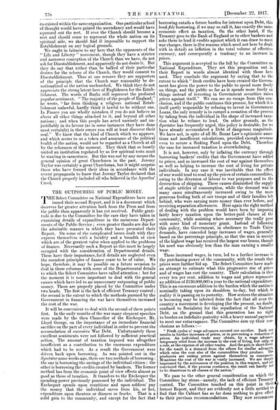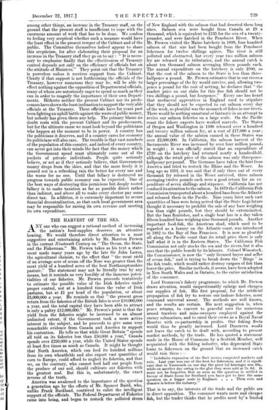THE OUTPOURING OF PUBLIC MONEY. 1 'IIHE Select Committee on National
Expenditure have now 1. issued their second Report, and it is a document which deserves far greater attention both from the Press and from the public than apparently it has yet received. Public grati- tude is due to the Committee for the care they have taken in examining details of expenditure in the numerous Depart- ments of the Public Service ; even greater thanks are due for the admirable manner in which they have presented their Report. On some of the complicated issues dealt with they express themselves with a lucidity and a breadth of view which are of the greatest value when applied to the problems of finance. Necessarily such a Report as this must be largely occupied with the consideration of Departmental details. These have their importance, for if details are neglected even the soundest principles of finance cease to be of value. We hope, therefore, it may be possible on a future occasion to deal in these columns with some of the Departmental details to which the Select Committee have called attention ; but for the moment it is more important to deal with the general causes which have led to an unnecessary outpouring of public money. These are properly placed by the Committee under two heads. The first is the lack of efficient Treasury control ; the second is the extent to which the methods pursued by the Government in financing the war have themselves increased the cost of the war.
It will be convenient to deal with the second of these points first. In the early months of the war many eloquent speeches were made by the then Chancellor of the Exchequer, Mr. Lloyd George, on the importance of an immediate financial sacrifice on the part of every individual in order to prevent the accumulation of excessive War Debt. Unfortunately these excellent sentiments were not followed by sufficient practical action. The amount of taxation imposed was altogether insufficient as a contribution to the enormous expenditure which had to be met. As a result the Government were driven back upon borrowing. As was pointed out in the Spectator some weeks ago, there are two methods of borrowing : the one is borrowing the savings'of the individual citizen ; the other is borrowing the credits created by bankers. The former method has from the economic point of view effects almost as good as those of taxation. It transfers to the Exchequer the spending-power previously possessed by the individual. The Exchequer spends upon munitions and upon soldiers' pay the money that the individual saves from his, or her, expenditure upon theatres or dinners or frocks. That is a solid gain to the community, and except for the fact that borrowing entails a future burden for interest upon Debt, this bond-fide borrowing. if we may so call it, has exactly the same economic effect as taxation. On the other hand, if the Treasury goes to the Bank of England or to other bankers and asks them to lend it credits against which it can draw to meet war charges, there is (for reasons which need not here be dealt with in detail) an inflation in the total volume of effective currency, and consequently a tendency to an increase in prices.
This argument is accepted to the full by the Committee on National Expenditure. They set this proposition out in their Report in words almost identical with those here used. They conclude the argument by saying that to the extent to which " fresh credits have been created the Govern. ment has given the power to the public to spend more freely on things, and the public no far as it spends more freely on things instead of investing in Government securities raises prices against itself." We can see no escape from this con- clusion, and if the public continues this process, for which it is itself partly responsible by refusing to invest in Government Loans, the only remedy is to compel a cessation of the process by taking from the individual in the shape of increased taxa- tion what he refuses to lend. On other grounds, as the Spectator has frequently urged, this policy is desirable, for we have already accumulated a Debt of dannerous magnitude. We have not, in spite of all Mr. Boner Law's optimistic asser- tions and insufficient calculations, provided enough revenue even to secure a Sinking Fund upon the Debt. Therefore the case for increased taxation is overwhelming.
It is not, however, only by inflating the currency through borrowing bankers' credits that the Government have added to prices, and so increased the cost of war against themselves as well as helping to increase the cost of living for private individuals. In any case it was inevitable that the effect of war would tend to send up the prices of certain commodities, owing to the diversion of labour to war purposes and to the destruction of shipping. These causes diminished the supply of staple articles of consumption, while the demand was in many cases simultaneously increased owing to the mom generous feeding both of our troops and of their families left behind, who were earning more money than ever before, and receiving separation allowances. Here again the right method of dealing with the problem would have been by imposing fairly heavy taxation upon the better-paid classes of the community, while assisting where necessary the really poor with some kind of monetary grant. Instead of following this policy, the Government, in obedience to Trade Union demands, have conceded largo increases of wages, in based on the percentage principle, so that the man m receipt of the highest wage has received the largest war bonus, though his need was obviously less than the man earning a smaller wage.
These increased wages, in turn, led to a further increase in the purchasing-power of the community, with the result that prices were further bid up. The Select Committee have made an attempt to estimate what this progressive rise of prices and of wages has cost the country. Their calculation is that every ten per cent. addition to wages and prices represents an addition of L130,000,000 a year to the national expenditure. This is an enormous addition to the burden which the nation is nominally taking upon its shoulders to-day, but which in reality it is passing on to posterity. How serious the situation is becoming may be inferred from the fact that all over the country a movement is developing (for the present, no doubt, confined to Socialists) for the repudiation of the National Debt, on the ground that this generation has no right to burden an indefinite posterity with a heavy annual payment to meet our extravagance. The Committee sum up their con- elusions as follows :— " Fresh cycles of wage advances succeed one another. Each one results in further increases of prices, or in preventing a reduction of prices. An individual trade may obtain, by a wage advaine temporary relief from the increase m the cost of living. but only, al a rule, at the expense of all other trades. And the gain is short-lwed. for the result is a demand from the others for similar Ravenna which raise the cost also of the commodities they produce. The producers are raising prices is themselves as CORSUMOM Meantime the cost of the war ni vastly increased. We are deeply impressed by the seriousness of the position in this respect, and am convinced that, if the process continuos, the result can hardly fail to be disastrous to all classes of the nation."
We pass to the other general consideration on which the Committee lay stress—namely, the lack of efficient Treasury control. The Committee touched on this point in their former Report, and they are evidently not a little nettled to find that the Cabinet has so far done nothing to give effect to their previous recommendations. They now recommenc among other things, an increase in the Treasury staff, on the ground that the present staff is insufficient to cope with the enormous amount of work that has to be done. We confess to feeling very sceptical whether such a measure would have the least effect in the present temper of the Cabinet and of the public. The Committee themselves indeed appear to share this scepticism, for after elaborating their proposal for an increase in the Treasury staff they go on to say : ' It is neces- sary to emphasize finally that the effectiveness of Treasury control depends not only on the efficiency of officials but on the attitude of Ministers." They point out that the Treasury is powerless unless it receives support from the Cabinet. Clearly if that support is not forthcoming the officials of the Treasury, however numerous they may be, will be able to effect nothing against the opposition of Departmental officials, many of whom are notoriously eager to spend as much as they can in order to magnify the importance of their own Depart- ments. Hitherto neither the present Cabinet nor its prede- cessors haveshown the least inclination to support the very able officials at the Treasury. These officials have for years past been fighting an uphill battle against the waste of public money, but nobody has given them any help. The primary blame no doubt rests with the present Cabinet and its predecessors, but for the ultimate cause we must look beyond the politicians who happen at the moment to be in power. A country has the politicians it deserves, and if a country cares for economy its politicians will also care. The trouble is that vast numbers of the population of this country, and indeed of every country, can never get into their minds the fact that the money which the Government spend must ultimately come out of the pockets of private individuals. People quite seriously believe, or act as if they seriously believe, that Government money drops from the skies, and that the more freely it is poured out in a refreshing rain the better for every one and the worse for no one. Until that fallacy is destroyed no progress towards public economy can be expected. One of the beat ways of destroying this pernicious but deeply rooted fallacy is to make taxation as far as possible direct rather than indirect, and above all to make every elector pay some direct tax. In addition, it is extremely important to secure financial decentralization, so that each local government area may be responsible for raising its own revenue and meeting its own expenditure.



























 Previous page
Previous page